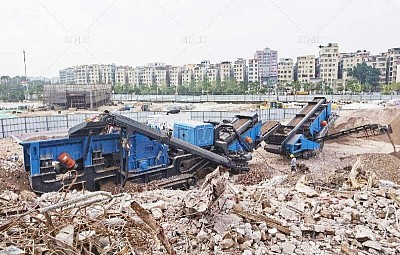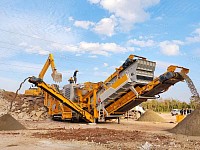Blogs
How Can Latin American Mines Efficiently Process Hard Rock? Mobile Crusher Provides The Answer
The mining industry in Latin America continues to face growing demand for efficient, flexible, and cost-effective solutions to process hard rock materials. With infrastructure projects and mineral exports playing a vital role in regional economies, many mine operators are looking for ways to reduce operational bottlenecks while increasing output. One of the standout innovations in recent years is the mobile stone crusher plant, which has become a game-changer in hard rock processing.
Unlike traditional fixed systems, mobile crushers(planta de trituracion movil) offer on-site flexibility, rapid deployment, and adaptability to extreme working environments. In this article, we explore how mobile crushing solutions are transforming mining operations in Latin America, especially in remote or challenging terrains.
The Challenges Of Processing Hard Rock In Latin American Mines
Hard rock mining presents unique difficulties. From quartz-rich ore to basalt and granite, the materials involved are dense, abrasive, and energy-intensive to process. In many cases, remote mine locations add layers of complexity, making logistics, power supply, and maintenance more difficult to manage.
Additionally, traditional stone crusher plant setups require extensive civil works, infrastructure investment, and long setup times. This has led many Latin American companies to seek more mobile, adaptable solutions that can be quickly relocated and scaled to suit project needs.
Mobile Stone Crusher Plants Offer Flexibility And Efficiency
The mobile stone crusher plant is designed for maximum portability and performance. Unlike stationary crushers, mobile units are mounted on wheels or tracks, allowing them to be moved directly to the mining site. This significantly reduces transportation costs and setup time, while improving responsiveness to project changes.
Operators can set up a mobile unit within a day, start crushing hard rock on-site, and relocate the unit once a particular phase of mining is complete. For mines spread across vast areas, or in mountainous terrain, this flexibility is critical.
Mobile crushers can handle various crushing stages—from primary to tertiary—depending on configuration. Equipped with jaw crushers, cone crushers, or impact crushers, these plants can be tailored to the hardness and abrasiveness of the specific material, ensuring efficiency and reliability.
Integration With Aggregate Crusher Plants For Better Productivity
In many Latin American operations, mobile crushing units are integrated into a broader aggregate crusher plant(planta trituradora de agregados) setup. This integration allows for seamless processing of mined material into different aggregate sizes required for construction, road building, and export.
For example, after the primary mobile crusher reduces large rocks to manageable sizes, secondary and tertiary crushers further refine the output. The result is a consistent and high-quality aggregate product suitable for immediate use or sale.
Such integration also helps operators reduce downtime, minimize manual handling, and streamline the entire crushing process. These improvements can lead to significant cost savings and higher return on investment over time.
Cost Advantages And Operational Savings
One of the major benefits of using mobile crushing equipment is the long-term reduction in operational costs. While the upfront investment in a stone crusher plant(planta de trituracion y cribado)—especially a mobile one—may seem high, the elimination of transportation costs, civil works, and prolonged setup times results in substantial savings.
Mobile crushers also consume less energy and reduce wear and tear on equipment due to optimized crushing sequences and intelligent controls. Automated systems allow for real-time monitoring of performance, helping mine operators maximize uptime and avoid costly breakdowns.
Additionally, the modular nature of mobile crushers allows for incremental scaling. Operators can start with a compact unit and expand capacity as demand increases, making it ideal for small-to-medium mining operations across Latin America.
Environmental Compliance And Sustainability
With growing pressure to meet environmental regulations, mobile crushers offer an edge in sustainability. Many modern units are designed to reduce dust and noise emissions, and their mobility minimizes the need for large-scale land disruption.
Furthermore, the ability to process material on-site reduces the carbon footprint associated with transporting raw rock to a distant processing facility. In countries with strict environmental policies, such as Chile and Colombia, this can be a key factor in obtaining permits and maintaining community support.
Future Outlook For Mobile Crushers In Latin America
As mining activity continues to expand across Latin America—particularly in countries like Peru, Brazil, and Mexico—the demand for mobile and modular solutions will only grow. Whether in gold mining, copper extraction, or construction aggregates, mobile crushers provide unmatched adaptability and cost control.
Operators looking for a stone crusher plant or aggregate crusher plant should carefully consider mobile options that align with their specific site conditions, production requirements, and long-term growth plans.
Conclusion
For Latin American mines aiming to process hard rock efficiently, the mobile crusher is no longer a luxury—it’s a necessity. With benefits like flexibility, rapid deployment, cost efficiency, and environmental adaptability, these machines are reshaping how mining operations are planned and executed.
Companies investing in a mobile stone crusher plant can expect not only faster project timelines but also better operational control and profitability. As technology continues to advance, mobile solutions will become even more essential in helping the Latin American mining sector thrive.
Simplify Your Workflow with Aggregate Crusher Plants
In today's fast-paced construction and infrastructure development world, efficiency and optimization are the keys to staying ahead. One of the most critical components in ensuring a smooth workflow within these industries is the production and management of aggregates. Aggregate crusher plants play a pivotal role in this aspect, significantly simplifying and enhancing the workflow of construction projects and material handling operations. Let's delve deeper into how integrating an aggregate crusher plant into your operations can streamline workflows, reduce downtime, and increase productivity.
Boosting Efficiency through Automation
- The Power of Automated Processes
One of the primary ways aggregate crusher plants simplify workflow is through the integration of automated systems. These systems control everything from the initial feeding of raw materials to the final output of graded aggregates. Automation not only speeds up production but also ensures consistency in product quality, a critical factor in meeting the stringent specifications of various construction projects.
- Real-time Monitoring and Control
With advanced control systems, operators can monitor and adjust the crushing process in real-time without having to be physically present at the site. This capability reduces downtime caused by mechanical failures or manual adjustments, as issues can be identified and addressed promptly. The result is a smoother, more efficient workflow that keeps projects on schedule and within budget.
Enhancing Sustainability and Compliance
- Reducing Environmental Impact
Sustainability is increasingly becoming a priority in all industry sectors, including construction and quarrying. Aggregate crusher plants contribute to environmental sustainability by reducing waste and enabling the recycling of construction debris into usable aggregates. Modern crushing plants are designed to minimize their carbon footprint through energy-efficient motors and by utilizing renewable energy sources where possible.
- Meeting Regulatory Standards
Regulatory compliance is another area where aggregate crusher plants simplify the workflow. By producing aggregates that meet specific regulatory standards for size, quality, and environmental impact, these plants help project managers ensure their projects comply with local and international regulations, avoiding costly fines and delays.
Streamlining Project Management and Cost Control
- Improving Supply Chain Management
Having direct control over the supply of aggregates through an in-house aggregate crusher plant(planta de agregado cantera de colombia) simplifies project management by eliminating dependencies on external suppliers. This control can lead to more predictable project timelines and budgets, as the availability of materials is guaranteed, and costs are more stable.
- Reducing Transportation Costs
By situating an aggregate crusher plant closer to the project site or using mobile crushing units, companies can significantly reduce the costs associated with transporting raw materials and finished products. This not only simplifies logistics but also contributes to lower project costs and reduced environmental impact from transportation emissions.
Conclusion
Incorporating an aggregate crusher plant into your operations can transform and simplify your workflow. From automating processes to enhancing sustainability and streamlining project management, the benefits are clear. As the demands on the construction and infrastructure development industries continue to grow, having an efficient, reliable, and compliant source of high-quality aggregates is more important than ever. Aggregate crusher plants offer a solution that meets these needs, providing a competitive edge in an increasingly complex and competitive market.



